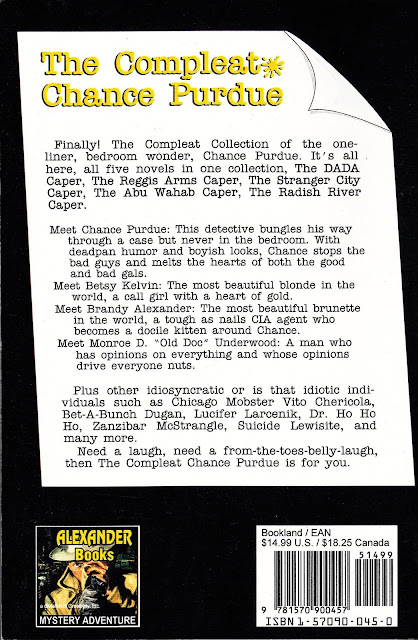
(Above) The DADA Caper, by Ross H. Spencer (Avon, 1978)
Whole decades have passed since I last read one of Ross H. Spencer’s novels. But I thought those paperback-only private-eye spoofs were a heap of fun back when I was looking for that kind of fun. His best-known protagonist was Chance Purdue, a “tough, tight-lipped, incompetent” Chicago gumshoe who undertook five “beer-soaked adventures and screwball cases” during the 1970s and ’80s, beginning with The DADA Caper (1978). Those books comprised brief chapters, all written in a one-sentence-per-paragraph style. Example:
Chance Purdue.Punctuation was pretty much non-existent, save for periods and question marks. The books abounded with outrageous male characters and callipygous female ones (not the least of whom was Betsy, Purdue’s call-girl girlfriend (sorry, she prefers the term “whore“). And, as The Complete Review observed, in its review of The DADA Caper, each chapter “comes with an epigraph, all ascribed to (the fictitious) Monroe D. Underwood—pithy, humorous (or would-be, anyway ...), worldly-wise but down to earth (as evidenced by the loose grammar and spelling) observations such as: ‘ … you show me a man what strikes while the iron is hot and I’ll show you a man with a whole mess of third degree burns ...”
That is my name.
Private Detective.
That was my occupation.
I handle anything.
That was my slogan.
Room 506 Braddock Building.
That was my address.
One-year lease.
Three hundred a month.
That was my mistake.
As Kevin Burton Smith remarks in his Thrilling Detective Blog,
Some people think they’re a real hoot.According to Wikipedia, Ross H. Spencer was born in Hughart, West Virginia, in 1921 and reared in Youngstown, Ohio. He served with an army infantry division during World War II, fighting in the Pacific campaign, settled in Chicago after his combat responsibilities ended, but subsequently enlisted in the U.S. Air Force during the Korean War. His friend and fellow author Jim Fisher recalled last year in his blog that “After working in Chicago as a railroader,
Some don’t.
 landscape contractor and chain-link fence salesman and installer for forty-two years, the cigar-smoking, beer-drinking writer returned to Youngstown with his wife, Shirley.”
landscape contractor and chain-link fence salesman and installer for forty-two years, the cigar-smoking, beer-drinking writer returned to Youngstown with his wife, Shirley.”(Right) Author Ross H. Spencer
He was a late-blooming fictionist. “Spence read a lot, a couple of books a week or more,” writes another pal, former newspaper reporter and mystery writer Dick Stodghill, “so one day Shirley came home with a mystery for him, a book about a character named Spenser. Spelled differently, pronounced the same. Spence read it and decided he could write one just as good as Robert Parker’s. Over the years a lot of people came to agree with him.”
“As a self-taught writer without a high school degree (he was kicked out of eleventh grade for smoking), Spence started writing at age 58,” Fisher explains. “During his relatively short but intense writing career, he published thirteen novels.” In addition to the Purdue yarns, Spencer penned three books starring Lacey Lockington, “a hard-drinkin’, two-fisted, no-nonsense straight-shootin’” Windy City shamus, the first of those being 1989’s The Fifth Script. He also produced one-off tales about “low-rent, hard-drinking stumblebum Chicago private eyes” Buzz Deckard, Birch Kirby, and Luke Lassiter.
Spencer died in 1998.
Someone must know the cause of his demise.
I don’t.
I’ve embedded the fronts from all five of his Chance Purdue “capers” in this post. I was probably drawn to these books, initially, by their quirky, sexy, type-prominent covers, and only later came to appreciate the stories inside. It is only too bad that no credit is given to the series illustrator anywhere in these paperbacks.

 (Left to right) The Reggis Arms Caper (Avon, 1979); The Abu Wahab Caper (Avon, 1980)
(Left to right) The Reggis Arms Caper (Avon, 1979); The Abu Wahab Caper (Avon, 1980)
 (Left to right) The Stranger City Caper (Avon, 1980); The Radish River Caper (Avon, 1981)
(Left to right) The Stranger City Caper (Avon, 1980); The Radish River Caper (Avon, 1981)
 Sixteen years after the publication of Spencer’s final Purdue story, all five novels in that series were gathered into a single volume by a publisher called Alexander Books. Like the other Purdue editions, 1997’s The Compleat Chance Purdue is out of print, but can still be acquired via online sources.
Sixteen years after the publication of Spencer’s final Purdue story, all five novels in that series were gathered into a single volume by a publisher called Alexander Books. Like the other Purdue editions, 1997’s The Compleat Chance Purdue is out of print, but can still be acquired via online sources.





No comments:
Post a Comment